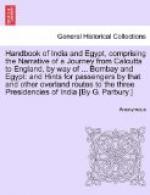[Illustration: A Koli woman.]
So the morning passes into mid-day, amid a hundred sounds symbolical of the various phases of life in the Western capital,—the shout of the driver, the twang of the cotton-cleaner, the warning call of the anxious mother, the rattle of the showman’s drum, the yell of the devotee, the curse of the cartman, the clang of the coppersmith, the chaffering of buyer and seller and the wail of the mourner. And above all the roar of life broods the echo of the call to prayer in honour of Allah, the All-Powerful and All-Pitiful, the Giver of Life and Giver of Death.
* * * * *
Evening.
[Illustration: The “Pan” Seller.]
As the sun sinks low in the west, a stream of worshippers flows through the mosque-gates—rich black-coated Persian merchants, picturesque full-bearded Moulvis, smart sepoys from Hindustan, gold-turbaned shrewd-eyed Memon traders, ruddy Jats from Multan, high-cheeked Sidis, heavily dressed Bukharans, Arabs, Afghans and pallid embroiderers from Surat, who grudge the half-hour stolen from the daylight. At the main entrance of the mosques gather groups of men and women with sick children in their arms, waiting until the prayers are over and the worshippers file out; for the prayer-laden breath of the truly devout is powerful to exorcise the demons of disease, and the child over whom the breath of the worshipper has passed has fairer surety of recovery than can be gained from all the nostrums and charms of the Syed and Hakim. Just before and after sunset the streets wear their busiest air. Here are millhands and other labourers returning from their daily labours, merchants faring home from their offices, beggars, hawkers, fruit-sellers and sweetmeat-vendors, while crowds enter the cookshops and sherbet shops, and groups of Arabs and others settle themselves for recreation on the threshold of the coffee-sellers’ domain.
There in a quiet backwater of traffic a small crowd gathers round a shabbily-dressed Panjabi, who, producing a roll of pink papers and waving them before his audience, describes them as the Prayer-treasure of the Heavenly Throne ("Duai Ganjul Arsh"), Allah’s greatest gift to the Prophet. “The Prophet and his children,” he continues, “treasured this prayer; for before it fled the evil spirits of possession, disease and difficulty. Nor hath its virtue faded in these later days. In Saharanpur, hark ye, dwelt a woman, rich, prosperous and childless, and unto her I gave this prayer telling her to soak it in water once a month and drink thereafter. And lo! in two months by the favour of Allah she conceived, and my fame was spread abroad among men. The troubles of others also have I lightened with this prayer,—even a woman possessed by a Jinn, under whose face I burned the prayer, so that the evil spirit fled.” He asks from two to four annas for the prayer sheet and finds many a purchaser in the crowd; and now and




